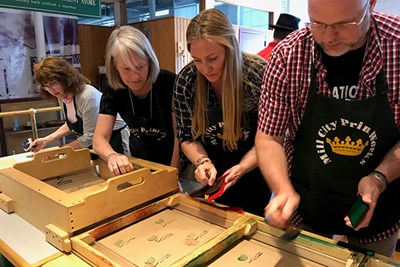State Department Funds Exchange Program
 Image by K. Webster
Image by K. Webster
08/21/2018
By Katharine Webster
Lesson No. 1 in critical thinking: The United States is a prosperous country, but ordinary people here face many of the same problems as their counterparts around the world.
“I learned that people are people everywhere. For example, society is male-dominated here, not in Egypt only. We are not alone,” says Eman Wally, a senior English language instructor at Cairo University who came to UMass Lowell as part of a State Department-funded exchange program this summer.
Wally was one of 25 professors and teachers of English from northern Africa, the Middle East, India, Korea, Japan and Southeast Asia who came for a two-week intensive course in teaching critical thinking skills through their American English classes, especially how to question and analyze texts such as stories and news articles.
The program, led by College of Education Prof. A.J. Angulo and Associate Dean Sharon Subreenduth, was funded by the U.S. State Department’s Office of English Language Programs, part of the Bureau of Educational and Cultural Affairs.
 Image by K. Webster
Image by K. Webster
“It’s very competitive, and it’s an honor for them to be selected,” Angulo says. “Many of these educators come from disadvantaged communities. They’re high-performing, highly motivated, very energetic, and they don’t take anything for granted. They’re here for a short period of time, and they know their experience is once in a lifetime.”
The grant was highly competitive, too: UMass Lowell beat out 16 other universities to host the Critical Thinking Skills Exchange scholars, thanks to the curriculum, which takes advantage of Lowell’s reputation and resources as a city that welcomes immigrants from around the world.
 Image by K. Webster
Image by K. Webster
The educators’ stay also included educational outings to Boston, Cambridge and the Lowell National Historical Park, bowling, shopping and a youth-led urban dance festival, Dance for Peace.
Nezha Youssefi, who teaches 14- to-18-year-old midlevel students in Fez, Morocco, says she was impressed by all of the creative and expressive opportunities for young people here. At her school, she invites her students to share their talents at the end of each term by singing, dancing, acting or reading their poetry aloud, but there is little support for such activities, she says.
 Image by K. Webster
Image by K. Webster
“My students are motivated, gifted and creative, but they don’t have spaces, materials and encouragement to share their talents and gifts,” she says.
Halima Kounniba, a high school teacher from Zagoura in southern Morocco, agrees that the education system in Morocco emphasizes rote learning rather than critical thinking. Students are focused on getting a degree that will guarantee them a safe job – often with the government – so they can buy a house and raise a family, she says. They lack confidence in their own creativity and abilities and also face cultural barriers.
Her biggest takeaway from the exchange program? Teaching critical thinking is about getting students to ask questions, not just acquire facts.
“It’s not what we teach them; it’s how we teach them, so that they can think and learn for themselves,” she says.
Angulo, who like Subreenduth has worked on other State Department Educational and Cultural Affairs Bureau grants to host international educators, says the visitors often leave with a more positive view of the United States and its people, as well as friendships and collegial relationships with each other.
 Image by K. Webster
Image by K. Webster
“It’s a good community here,” Sam says. “People can work closely, it’s a positive environment and people can ask for help.”
Wally says she was impressed that, at the Dance for Peace, people of all racial, ethnic and economic backgrounds came together.
“I like the acceptance part, that you don’t judge each other according to color, religion or social standards. This is something we need to learn,” she says.
“Personally and professionally, I’ve learned a lot. I will return a whole new person.”




